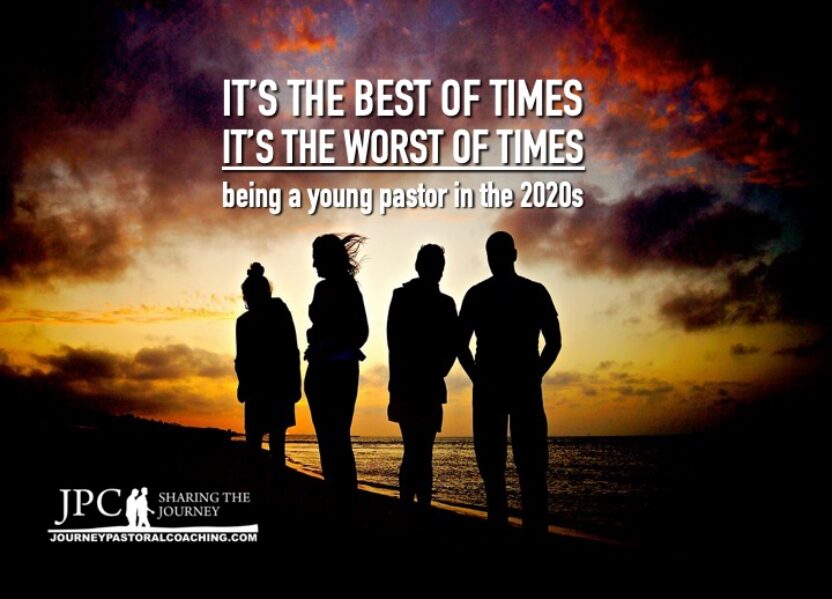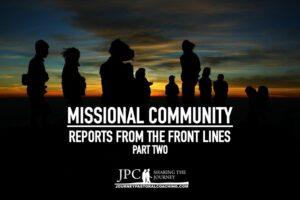The Best of Times. The Worst of Times.
The first paragraph of “A Tale of Two Cities” by Charles Dickens is one of the most recognizable openings in literature. It’s words are evocative, setting the reader immediately into the ethos of Dickens’ subject: the French Revolution
Allow me to adapt those words of Dickens to our subject today:
“For young pastors, it is the best of times, it is the worst of times. It is the age of our prosperity, it is the age of our poverty. It is the epoch of care for us, it is the epoch of neglect. It is the season of Jonathans, it is the season of Shimeis. It is the spring of our health and hope, it is the winter of burdens beyond what we can bear. We have everything before us, we have nothing before us. We are pursuing Heaven, we are pursued by hell.”
Dickens writes of the late 18th century and the French Revolution. During these historic days, many in France in particular, and in England as well, were expressing “the best of times” ideals of freedom, equality, and brotherhood, while simultaneously experiencing “the worst of times” realities of oppression, loss, and destitution at the hands of the very people who espoused those ideals.
As the director of a national pastoral coaching ministry, I have the privilege of investing my life in a group of young ministers across America. Day by day, I walk with them individually and collectively as they give themselves to living out their creation and calling.
In addition to pastoring members of our ministry, I take a limited number of calls from young pastors across the country who want to discuss life in ministry generally and the challenges they face locally. I also travel in ministry, meeting and talking with many in pastoral ministry.
Being a pastoral coach gives me access to the world of young pastors in America today.
This is why I invoke and adapt the words of Dickens in speaking of them.
For young pastors, It is the best and the worst of times.
It is the age of their prosperity and the age of their poverty
According to the U.S. Bureau of Labor Statistics, the median annual wage for a full-time minister is $58,920. It is important to note three significant factors in this figure:
First, this median is national: it includes all denominations and regions of the US. Ministeriall salaries in some denominations are higher than in others and the cost-of-living across the US varies.
Second, this figure includes all income sources for ministers, church salary and non-church earnings.
Third, this figures is not only for pastors, but all “clergy.” Not all clergy are pastors.
Surveys show that pastors of large churches are well provided for financially, with adequate salaries and church-financed benefits like health insurance (CFI) and retirement (CFR).
However,
Fifty-nine thousand dollars is the median income. This means there are as many ministers below this level as above it. Young pastors with families are overwhelmingly below the median.
And for every full-time pastor in America, there is more than one bi-vocational pastor in America. The bi-vocational pastor is not earning anywhere near the median.
Consider the following:
Fewer than half of pastors who serve alone have church-financed health insurance (CFI);
One in three lead pastors serve without the benefit of a CFI:
Just 44% of pastors who serve alone have church-financed retirement (CFR).
36% of senior pastors have no CFR.
The overwhelming majority of small church pastors have neither CFI nor CFR – they depend on state programs for family health care. Or they and their family do without them.
The salaries of many ministers, especially in small churches, fall below community norms.
Consider this perfect storm scenario. You are a young pastor, married, and have children. You pastor a small church. You are bi-vocational, and your spouse works a job outside the home as well. You have no CFI or CFR. No, it’s not fiction. It is a fact of life for many young ministers and their families.
Journey Pastoral Coaching recently surveyed young pastors on the subject of pastoral compensation – salary, health insurance, retirement, and pastoral personal development. You can access that survey here.
Here’s a sampling of the results:
38% of staff pastors say their salary is sufficient;
0% of bi-vocational pastors say they have church-funded health insurance;
50% of lead pastors say they their church contributes to their retirement.
For young pastors, It is the age of their prosperity and the age of their poverty;
It is the epoch of care for them and the epoch of neglect
Almost all lead and staff pastors have paid vacations.
A recent Journey Pastoral Coaching survey of ministers under the age of 40 (U40s) pastors revealed the following:
The average pastor (lead or staff) receives between three and four weeks of vacation per year, regardless of the time of service at their current church and a reasonable number of personal days.
85% of all pastors can attend conferences and retreats at church expense;
60% of all pastors serve churches that emphasize or give opportunities for team or relationship building;
82% of all pastors serve in churches that honored them during Pastor Appreciation Month in October 2024 or sometime in 2024.
However,
Some bi-vocational pastors are forced to work during their church vacation weeks to keep up financially, opting for a few days’ break rather than a full vacation.
40% of pastors serve in churches that do not emphasize team building or peer relationships.
18% percent of pastors serve churches that did not honor them during Pastor Appreciation 2024.
Compounding the neglect is young pastors’ relationship to their denomination. Many don’t know their local or area leaders; neither are they known by them. All too often, the only time U40s hear from denominational leaders is when they are late with their required monthly tithe to headquarters.
This neglect has sparked the recent rise in pastoral coaching and mentoring ministries in America. Ministries like Journey, some large and some small, are operating across the country, each one doing all it can to help young ministers build strong for a lifetime of healthy and effective ministry.
At Journey, we provide coaching at no financial cost to our members. While we invite our members’ churches to support Journey, it is not required. Members pay for coaching by investing in each other. We invite you and your church to help us continue investing in young ministers by becoming a Journey partner. Click here to learn more.
For young pastors, it is the epoch of care for them and the epoch of neglect.
It is the season of Jonathans and the season of Shimeis.
Many young pastors – young Davids – are blessed to have Jonathans in their lives, peers in ministry who understand and encourage them in their life and ministry.
However, most pastors, especially young ones, say they have no Jonathan-encourager. Study results vary, but it is clear that a significant number have no close friend in whom they can confide. Many know only Shimei-accusers. They know loneliness and isolation all too well.
In 2015, The Barna Group found that 42% of pastors feel lonely and isolated often or sometimes. In 2023, that number had increased to 65 percent.
That same Barna study found that pastors who rated their sense of having “true friends” as “excellent” fell from 34% in 2015 to just 17% in 2022 – a 50% decrease.
Contrary to our instincts, pastors under the age of 50 report having markedly less satisfying friendships than pastors over the age of 50.
A majority of young pastors never or rarely receive a call from a friend in ministry. Yes, other ministers call, but almost always to ask for something or to talk church, rarely just to talk about life.
Young pastors need Jonathans. Someone not just to talk to, but someone to walk with.
Side note to young pastors: My experience as a pastor of pastors reveals that when young pastors become a Jonathan, they almost always find a Jonathan of their own.
For young pastors, it is the season of Jonathans and the season of Shimeis.
It is the spring of their health and hope as well as the winter of burdens beyond what they can bear.
In terms of health, young pastors in their 20s and 30s will probably never be healthier or have more energy. In many ways, they are at their physical and creative peak.
In terms of hope, these pastors are in a season of anticipation of ever-greater days in service to God. Adding to these feelings of hope, they are in the early years of marriage, starting families, and watching their children grow. They are serving in their first ministry positions. In many ways, they are in the springtime of hope.
However,
Because they are in the early years of marriage and early ministry positions, they are still trying to establish themselves financially. Churches pay smaller salaries to younger ministers and often require more of them precisely because they are younger and “have more energy” – or even more because they are single or married without children. The stories are legion.
A study of 1000 pastors revealed that 65% of pastors work more than 50 hours per week. The median is 55 hours per week.
While there are signs of a post-COVID rebound, many pastors report a lingering reluctance among church members to commit. These pastors struggle to find volunteers to lead or serve in ministries. This means that in addition to their regular pastoral duties, these pastors find themselves occupied with church triage, spending much of their time trying to cover ministry bases in classes, the nursery, property maintenance, and other areas. Pastors pray for a return to not just pre-Covid days but to eternal Romans 12 days. But until then, the burden is theirs to bear.
This is especially difficult for two groups of young ministers: the bi-vocational pastor and the pastor with children. The bi-vocational pastor is already stretched and stressed by carrying two jobs. The seemingly never-ending search to find volunteers takes a profound toll on the pastor and their family. The same stress is true for the full-time younger pastor, even if to a lesser degree.
For young pastors, it is the spring of their health and hope as well as the winter of burdens beyond what they can bear.
They have everything before them and yet nothing before them.
Do you remember when you started out in marriage and began your family? Your whole life spread out before you like a yellow brick road and there was nothing to stop you.
Young pastors have these same feelings as they start out in life and family.
And in ministry. Their whole ministry life spreads out before them, yes, like a yellow brick road. And though they know there will be challenges ahead, they are convinced that nothing will stop them in fulfilling their calling, reaching the world with the Gospel of Jesus, and honoring their Lord.
They have everything before them.
And yet, while some young ministers are thriving, many are only surviving. Some are doing neither: they are wearing down, burning out, and giving up.
In my denomination, the Assemblies of God:
The number of U40s has decreased in 17 of the last 22 annual reports available for review;
There are almost 21% fewer credentialed U40s today than there were in the year 2000.
According to Barna, the period between 2015 and 2022 saw a crushing drop among pastors who measured their lives as “Excellent” in the following areas of health:
Spiritual well-being diminished from 37% to 14% – a 62% decrease;
Physical well-being dropped from 24% to 9% – a 54% decrease;
Mental and emotional health fell from 39% to 11% – a 72% decrease
Overall quality of life crashed from 42% to 18% – a 57% decrease
Young ministers are giving out. And they are doing so in more ways than one.
They and their families are giving out in whole-hearted, sacrificial service in hopes of harvest for the Kingdom of God, the strengthening of believers in Christ, and the salvation of many.
But even with their deep commitment and high aspirations, many are giving out.
As in done with it all.
Young pastors have everything before them and yet nothing before them.
They are pursuing Heaven and pursued by hell.
Have you prayed recently with your pastor? I mean personally, one-on-one?
Have you heard your pastor pray for you, your family, and your church? Have you heard their heartfelt concern for you and your soul?
I have. And I do. It is stirring to hear young pastors pray for their churches, families in the church, and their own ability to minister the Gospel to you. It is soul stirring.
Do your pastor a favor. Do yourself a favor. Take them aside and ask them to pray for you. Feel the moving rush of their passionate pursuit of heaven for you.
And then, pray for them. Pray as if your soul and theirs depends on it. Pray knowing Heaven stands ready to answer. Pray knowing Satan and his hellish demons crouch at the door ready to attack.
From one of my favorite hymns of the church:
“Rise up, O men of God!
Be done with lesser things;
Give heart and soul and mind and strength
To serve the King of Kings.
“Rise up, O men of God!
The church for you does pray!
Sent forth to serve the needs of men
Christ our strength is great.
Pastors have the strength they need to rise up as we, the church, pray!
Pastors have the strength they need to be done with lesser things as we, the church, pray!
Pastors have the strength they need to give heart and soul and mind and strength to serve the King of Kings as we, the church, pray!
Christ, our strength is great! And we all experience greatness as we pray for the pastors who lead us.
It’s true for all pastors, whatever their age. I don’t know what I would do if I did not know that the young pastors I serve every day are praying for me.
Young pastors are pursuing Heaven and pursued by hell.
FINAL THOUGHT
It is clear that we as a church need to do all we can to take care of our pastors, especially young pastors.
And not just for their sake, but for our sake: if pastors are not healthy, how can the church be healthy?
If the church of today is not healthy, how can the church of tomorrow be healthy?
It is clear that we need to steward the gift God has given the church. Your church.
“Steward” is defined as tending or caring for something as the owner would do if personally present. What a powerful thought! Imagine partnering with Jesus to take care of your pastor just as if Jesus were personally present. Guess what? He is.
As I mention above, two weeks ago, I presented the findings from Journey’s recent survey of young pastors on the subject of pastoral compensation – salary, health insurance, retirement, vacation, and personal development. You can access that survey here.
In my next article in two weeks, I’ll share several ways you and your church can steward your pastor, and so, steward your life and your church.
SOURCES:
- Staff. “5 Shocking Realities About the Reality of Pastoral Burnout.” Western North Carolina Conference of the United Methodist Church. 12 April, 2023. https://www.wnccumc.org/resourcedetail/5-shocking-realities-about-the-real-state-of-pastor-burnout-17392915
- Rainer, Thom. “Seven Concerning Findings about Benefits for Pastors and Other Church Staff.” Church Answers. February 15, 2016. https://churchanswers.com/blog/seven-concerning-findings-about-benefits-for-pastors-and-other-church-staff/
- Rainer, Thom. “Your Church is Probably Not Paying Your Pastor Enough.” Church Answers, 13 December, 2023, https://churchanswers.com/blog/your-church-is-probably-not-paying-your-pastor-enough/
- US Bureau of Labor Statistics. “Occupational Employment and Wages, May 2023,” May 2023, https://www.bls.gov/oes/current/oes212011.htm
- Staff. “7-Year Trends: Pastors Feel More Loneliness and Less Support,” Barna Group, 12 December, 2023, https://www.barna.com/research/pastor-support-systems/
- Sam Rainer. “4 Reasons Pastor Lack Work-Life Balance.” BP Toolbox, 8 January 2024, https://www.baptistpress.com/resource-library/bptoolbox/4-reasons-pastors-lack-work-life-balance/
———-
NOTE: Journey Pastoral Coaching exists to provide pastoral coaching to Millennial ministers.
Saddled with large student debt, just beginning to set up homes and start families, and serving in low paying first and second positions, Millennials are those who most desire but can least afford to pay for pastoral coaching.
We are able to do so thanks to the faithful and generous support of individuals and churches like yours who want to see young leaders not only enter the ministry, but remain in the ministry.
Now, more than ever, we need your help.
If you or your church would like to help Millennial ministers across the US and overseas build strong for a lifetime in ministry, please click here to support Journey monthly or with your one-time gift. Thank you.
We also invite you to click and subscribe to our twice-monthly blogs at journeypastoralcoaching.com
“Of all vocations, surely the gospel ministry is the one whose paradigm is most radically formed by the dynamics of godly mentorship.”
Stephen BaldwinStephen Baldwin






